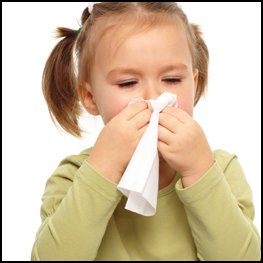
The snow is finally threatening to melt and cabin fever is reaching its peak. We can all breathe a sigh of relief that we can finally get the kids outdoors without the hassle of extra sweaters, snowsuits, boots, mittens, hats and scarves. If you are noticing that your child seems to be getting a cold (runny nose, itchy eyes and throat, congestion, etc.) and can’t seem to shake it, your child may be suffering from allergies. Many kids have allergies. They can have food allergies and/or environmental allergies. Symptoms can range from mildly annoying to life-threatening. So what exactly are allergies, and what do you need to know about them?
Allergies are an overreaction of the immune system to what would normally be considered a harmless substance. When someone with an allergy comes in contact with the substance they are allergic to (the allergen), their body produces antibodies to protect from the ‘invader’.
As a result of these antibodies, other substances, including histamine, are released into the bloodstream affecting a person’s nose, throat, eyes, skin, etc., in an attempt to rid the body of the ‘invading’ allergen.
So why do some people develop allergies and others don’t? We’ve known for a while that the tendency for allergies is often hereditary. This doesn’t mean that just because parents are allergic to something the kids are guaranteed to be too. It just means that if a parent has an allergy, it is more likely the child will have an allergy.|
The good news is that we now know certain things to do to reduce a child’s chance of developing allergies:
• Recent studies have shown that when mothers take probiotics (the good bacteria naturally found in your gut) during pregnancy, their children have reduced rates of allergies and asthma. Some studies are also finding that giving infant-specific probiotics to babies also reduces allergies and eczema. I would definitely recommend a good quality probiotic, such as HMF Maternity for pregnant women or HMF Natogen for young children, when allergies are a concern. Good intestinal flora will help with both food and airborne allergies.
• Breastfeeding exclusively for the baby’s first six months has been shown to substantially decrease the risk and severity of food allergies in families with a strong history of them.
• Eating fermented foods such as sauerkraut, kimchi and yogurt, helps provide probiotics for a healthy gastrointestinal tract, which reduces allergies.
• For those suffering from airborne allergies, a good quality air filter, such as IQ Air, is very helpful at home. These air filters reduce the particles circulating in the air, which reduces exposure to the allergens. Common airborne allergens that can be filtered include dust, pollen, mold and pet dander.
If your child does have allergies, you can take comfort in knowing that most children outgrow their allergies by their mid-20s. In the meantime, products like Sabalia by Boiron or homeopathic lemon quince can help relieve symptoms of seasonal allergies. Those who suffer from anaphylactic allergic reactions should always have access to an EpiPen and exposure to their allergens needs to be avoided!
Dr. Stephanie Andrews, ND, is a licensed naturopathic doctor with an active family practice in Calgary. She provides wholistic and natural treatments, through individualized care, that focus on prevention.
Calgary’s Child Magazine © 2024 Calgary’s Child